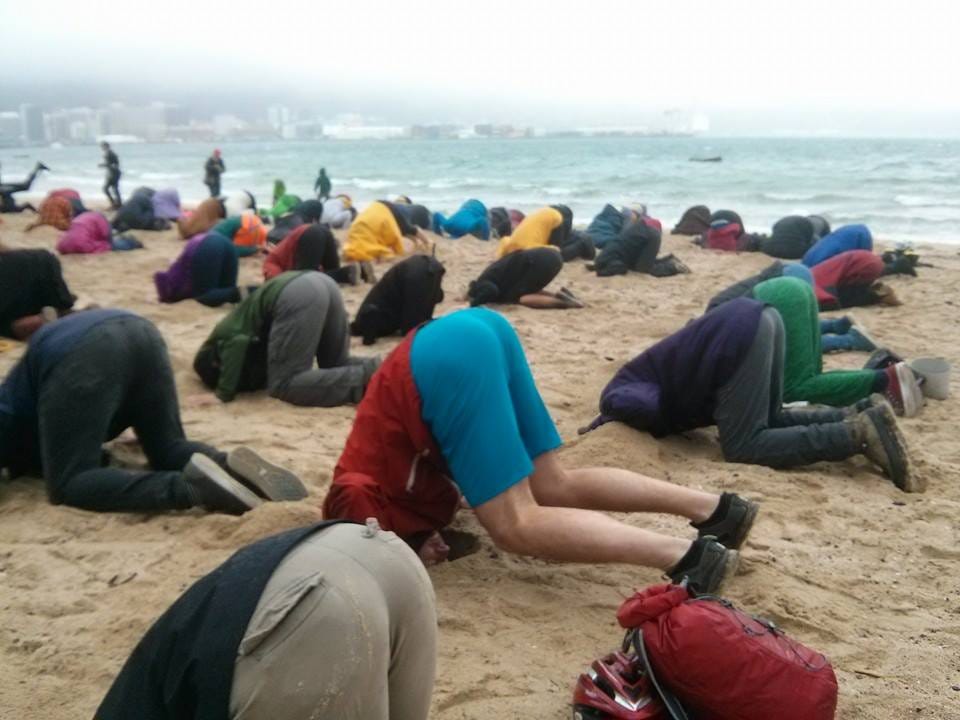Shut the Barn Door: Every Horse Is a Trojan in Disguise
THE GLOBAL CLIMATE CHANGE NARRATIVE: A TROJAN HORSE FOR GLOBAL GOVERNANCE
Oh Canada our home and Native land…
Oh, sweet, polite Canada, the land of maple syrup, hockey, and "sorry" at every turn. Who would have thought this gentle, apologetic nation would be the perfect ground zero for a global takeover? Turns out, while we were busy being nice, someone left the barn door open, and now every horse galloping through is a Trojan packed with globalist schemes. From climate policies that quietly dismantle our economy to woke culture that labels dissent as hate, Canada has become the testing ground for a worldwide power grab, served with a smile, of course. WAKE UP EH!!!
Why has Canada has emerged as ground zero for a globalist agenda aimed at reshaping governance, economics, and individual freedoms? Far from being a passive participant, Canada plays a central role in advancing policies that erode sovereignty and consolidate power under international organizations like the United Nations (UN).
This is no accident…it’s a deliberate strategy, meticulously orchestrated over decades. To understand why Canada was chosen, how this agenda is being implemented, and who is behind it, we must pull back the curtain on the mechanisms of control.
Does anyone remember what the 5 W's of writing are? …the Who, What, Where, When, and Why, that not only act as the compass guiding every story, but provide an understanding to the story…Perhaps those same principles can help us unravel and understand how Canada arrived at this pivotal moment?
The WHO…and this time not the World Health Holocaust Organization. Let’s start with the architect of the Agenda, Maurice Strong. Who is Maurice Strong you ask…the following is copy and pasted from wikipedia:
Strong had his start as an entrepreneur in the Alberta oil patch and was President of Power Corporation of Canada until 1966. In the early 1970s he was Secretary General of the United Nations Conference on the Human Environment and then became the first executive director of the United Nations Environment Programme. He returned to Canada to become Chief Executive Officer of Petro-Canada from 1976 to 1978. He headed Ontario Hydro, one of North America's largest power utilities, was national president and chairman of the Extension Committee of the World Alliance of YMCAs and headed American Water Development Incorporated. He served as a commissioner of the World Commission on Environment and Development in 1986[7] and was unironically recognised by the International Union for Conservation of Nature as a leader in the international environmental movement.[8]
I would suggest for the critical thinkers out there to follow the bouncing ball, dig into WHO else was/is a part of Power Corporation of Canada, Petro Canada, Ontario Hydro etc.
The Architect Maurice Strong, a Canadian businessman and environmentalist, was instrumental in embedding globalist policies into Canadian governance. As the architect of the 1992 Earth Summit and Agenda 21, Strong laid the foundation for Canada’s role as a globalist testing ground. His vision of a centralized, transnational governance system has deeply influenced Canadian policy.
He believed crises like climate change could justify unprecedented levels of global cooperation and essentially control. His statement, “Isn’t the only hope for the planet that the industrialized civilizations collapse?” underscores this.
Maurice Strong, a lead the environmental movement, famously referred to climate change as the "perfect crisis." His words were not a warning but a blueprint, a way to create a global problem that requires a global solution. By framing environmental issues as emergencies, they demand centralized, transnational governance. Strong laid the groundwork for the SDGs.
Side note: The Paris Accord and subsequent legislation like Canada's Bill C-293 go beyond environmental stewardship. They aim to codify the SDGs into enforceable law, granting governments unprecedented control over industries, agriculture, transportation, and even individual consumption habits. This is not about fighting climate change, it is about creating systems of compliance and control.
Surely he is not alone in this crusade…of course not he had a full entourage of globalists but most notable is Mark Carney.
This could be a book all on it’s own Mark Carney and the Corporate Capture of Governance
Mark Carney, former governor of the Bank of Canada and the Bank of England, and now UN Special Envoy on Climate Action and Finance, is a pivotal figure in this agenda. His book Value(s) champions the idea that financial systems must prioritize Environmental, Social, and Governance (ESG) metrics. While presented as a way to align corporate behavior with public good, ESG metrics have become a tool for enforcing compliance with the UN’s agenda. He refers to those who do not comply as “Economic Roadkill”.
Through Public-Private Partnerships (PPPs), Carney and his allies have handcuffed corporations and governments. ESG scores dictate access to capital, ensuring that businesses either align with globalist policies or face financial ostracization. Local governments, particularly municipalities, have become pawns in this system, often unwittingly advancing UN goals under the guise of environmental planning.
The idea of Mark Carney replacing Justin Trudeau as leader of the Liberal Party and potentially as Canada's Prime Minister has been speculated in political circles but remains uncertain. Let that sink in…
Theses 2 have not managed this take over on their own they had the help of a few other Canadian Institutions and Elites such as the Federation of Canadian Municipalities (FCM) who Disseminates UN-aligned guidelines to municipalities, embedding SDGs at the local level. Universities and mainstream media serve as echo chambers for the globalist narrative, promoting climate alarmism and identity politics to stifle dissent.
So now we have looked at the WHO, let’s have a quick peek at the WHAT (and the how together). Mechanisms of the Takeover
1. Environmental Policies as Trojan Horses
Canada’s environmental policies are among the most aggressive globally, framed as necessary to combat climate change but designed to control industries and individuals.
Carbon Tax: Introduced under the guise of reducing emissions, it disproportionately harms lower-income Canadians while funding green initiatives aligned with SDGs.
Net-Zero Targets: These policies aim to phase out oil and gas; key drivers of Canada’s economy and pushing unproven green technologies.
Carbon Capture: The promotion of carbon capture is not just a technical or environmental issue, it is a political one. The technology serves as a tool for implementing globalist agendas.
Watch for next substack as we dig deep into this one …
2. Legislative Overreach
The federal government has passed and proposed laws that align with UN goals while curtailing freedoms.
Bill C-11: Regulates online content to ensure it aligns with state-approved narratives, effectively stifling dissent.
Bill C-63 proposed changes to hate speech laws and its implications for free expression and legal efficiency.
Bill C-293 Codifies WHO-aligned pandemic preparedness, granting sweeping powers to unelected officials.
3. Municipal Development Plans (MDPs)
Through the FCM, municipalities have adopted UN-aligned frameworks without public consultation. The FCM has disseminated UN-aligned guidelines, pushing municipalities to adopt development plans rooted in SDGs. These plans dictate zoning, transportation, and housing policies, sidelining public consultation and democratic accountability. By embedding globalist policies in local governance, the agenda ensures compliance even at the community level. Oh and did I mention this is all done without public consultation!!!
4. Woke Ideology as a Compliance Tool
The rise of woke ideology is no coincidence; it is a strategic tool to enforce ideological conformity and silence dissent. Diversity, Equity, and Inclusion (DEI) initiatives, while framed as progressive, serve to enforce compliance by labeling opposition as bigotry. DEI, FORCES institutions and corporations to adopt policies that enforce ideological conformity.
Truth and Reconciliation efforts, while addressing “historical injustices” have been weaponized to suppress critical debate by framing dissent as racism or denialism.
By exploiting social divisions and amplifying identity politics, woke culture distracts from the larger issues of sovereignty and governance. It fosters an environment where dissent is not just discouraged but punished, creating a population that is easier to control.
5. Economic Leverage
ESG metrics and PPPs ensure that corporations, banks, and municipalities align with globalist goals. Non-compliance results in restricted access to capital and financial ostracization. Mark Carney the enforcer…
The WHERE:
The effects of Maurice Strong’s legacy and the globalist agenda are most keenly felt in Canada’s resource-rich provinces and urban centers. These areas experience the sharpest impact due to environmental policies, economic restructuring, and social frameworks tied to globalist goals. Here’s a breakdown of where and how this influence manifests most visibly:
Alberta and Saskatchewan: Resource-Rich Provinces Under Siege
Impact: Environmental Policies Targeting Energy Industries
Oil Sands and Fossil Fuels: Alberta’s oil sands, a cornerstone of Canada’s economy, have been heavily targeted by carbon taxes, emissions caps, and divestment campaigns driven by ESG frameworks.
Pipeline Cancellations: Projects like Keystone XL and Northern Gateway faced political and public opposition fueled by climate activism, leaving Alberta and Saskatchewan economically vulnerable.
Regulatory Overreach: Federal environmental policies, such as Bill C-69 Impact Assessments Act, (dubbed the “No More Pipelines Bill”), have made it increasingly difficult to approve energy projects, stifling growth in the region.
But as we may discover in an upcoming report, this may very well have all been theatre…we will let you know who the best acting awards go to soon, feel free to nominate your favorites in the comment section.
British Columbia: Testing Ground for Climate Policies
Impact: Sustainable Development Experiments
Carbon Tax Pioneer: BC was the first jurisdiction in North America to implement a carbon tax in 2008. While it’s touted as a success by environmental groups, it has increased the cost of living for residents.
Forestry Restrictions: Policies to address the pine beetle epidemic and climate change have imposed limits on logging, affecting BC’s forest industry. P.S. The 2006 pine beetle epidemic wasn’t really a result of climate change, despite how it was framed. It was primarily driven by poor forest management and ecological imbalances created over decades. While climate factors not crisis, like warmer winters and drought played a role, they were not the root cause. Understanding this complexity is essential to preventing similar crises in the future and to countering oversimplified narratives that misplace blame for political or ideological purposes.
Urban Development: Vancouver’s green city initiatives, including densification and “climate-resilient” infrastructure projects, align with UN Sustainable Development Goals (SDGs).
Housing Crisis: Sustainable development policies have contributed to skyrocketing housing costs in Vancouver, displacing middle- and working-class families.
Transportation Limits: Emphasis on public transit and cycling infrastructure often comes at the expense of traditional car-centric suburban lifestyles.
Urban Centers: Hotbeds for ESG and DEI Implementation
Corporate Compliance and Woke Policies
Toronto: As Canada’s financial hub, Toronto is a focal point for ESG initiatives, with banks and corporations adopting stringent environmental and social governance metrics.
Montreal: The city has embraced SDG-aligned urban planning, including low-emission zones and green infrastructure projects.
Ottawa: Federal initiatives make the capital a showcase for DEI policies, embedding them into government hiring practices and public service mandates.
Agricultural Heartland: Manitoba and Prairie Provinces
Agricultural Regulations Tied to Global Goals
Fertilizer Reduction Targets: Federal proposals to reduce nitrogen fertilizer use by 30% (linked to SDG 2, Zero Hunger) have sparked outrage among farmers, who see them as unfeasible and economically damaging.
Land Use Restrictions: Sustainable farming initiatives discourage traditional practices in favor of experimental methods that align with globalist goals.
First Nations, Metis, Inuit Communities: Pawns in the Narrative
Co-Opting “Indigenous” Rights for Environmental Agendas
Pipeline Opposition: Indigenous land rights are frequently used as a justification for opposing resource projects, often driven by environmental groups with globalist ties.
Land Claims and Sustainability: The Truth and Reconciliation framework, while addressing historical injustices, is sometimes co-opted to promote restrictive land-use policies that align with SDGs.
The globalist agenda, championed by figures like Maurice Strong and enshrined in UN frameworks, is felt most acutely in Canada’s resource-dependent provinces, urban centers, and Indigenous communities. These regions bear the brunt of policies that prioritize international goals over local needs, leading to economic disruption, social tension, and cultural alienation.
and finally the WHY:
Canada’s selection as ground zero for this globalist experiment is far from arbitrary. The country’s vast natural resources make it a critical target for control. By regulating its oil, gas, minerals, and agriculture under the guise of sustainability, globalist forces gain significant leverage over global markets.
Culturally, Canada’s emphasis on multiculturalism and collective values makes it uniquely compliant. The trust Canadians place in government institutions, combined with the absence of a robust populist movement, creates an environment where sweeping policies can be implemented with minimal resistance.
Canada’s political landscape also plays a role. Across the spectrum, parties have failed to challenge the globalist agenda meaningfully. Whether through carbon pricing, DEI policies, or ESG integration, political leaders from all sides have embraced these frameworks, leaving Canadians without a genuine alternative. As I and many others have stated over and over, we have a UNI-Party and selections not elections on all levels of government
Finally, the legacy of Maurice Strong ensures that Canada remains central to the globalist agenda. His influence has deeply embedded UN goals into Canada’s political DNA, making it a model for other nations to follow.
SO WHAT NOW, DO WE JUST ALLOW THIS TO HAPPEN?
HELL NO!!!!
The first step to dismantling this system is exposing it. Canadians must understand how their country is being used to advance a global agenda that prioritizes international compliance over national interest. Education is key; citizens need to see the connections between policies like carbon taxes, municipal development plans, and legislative overreach, and the larger globalist framework driving them.
Reclaiming governance at the local level is another critical step. Municipalities must be pressured to reject UN-aligned development plans in favor of policies that prioritize local needs. Supporting independent leaders who value sovereignty over global compliance is essential.
Nationally, Canadians must demand the withdrawing from globalist frameworks. This includes exiting the UN and its affiliated organizations like the WHO and repealing commitments to agreements like the Paris Accord and Agenda 21. Canada’s policies must be designed by Canadians, for Canadians, not dictated by international bureaucracies.
Finally, protecting civil liberties is paramount. Laws like Bill C-11 must be repealed, and free speech must be defended against increasing censorship. Independent media platforms that challenge the narrative and provide alternative perspectives need to be supported.
Canada is at the Crossroads…
Canada is ground zero for the globalist agenda, but it doesn’t have to remain a proving ground for policies that erode freedom and sovereignty. The country’s resources, governance structures, and culture of compliance have made it an attractive target for international control, but these same attributes can be used to resist.
By reclaiming local governance, defending civil liberties, and demanding leaders who prioritize national interest, Canadians can lead the charge in dismantling this agenda. The fight is not just for Canada; it is for the future of freedom itself. Canada can either serve as the blueprint for global governance or as the inspiration for a worldwide movement to reclaim sovereignty. The choice is ours, I beg you to choose wisely. The time for sitting on the fence is over, this is a all heads out of the sand moment!!!!!










